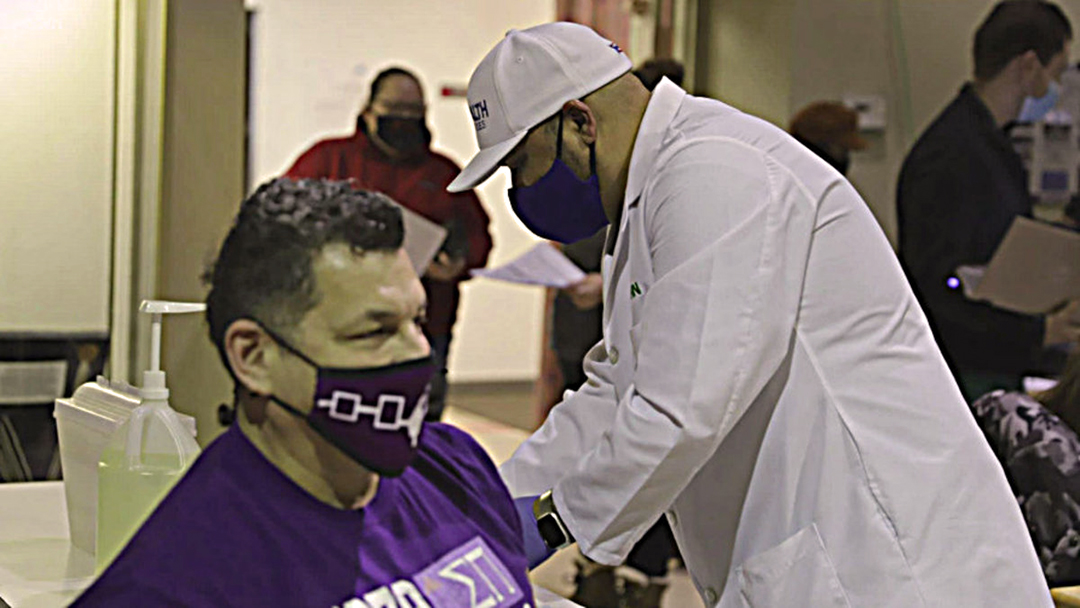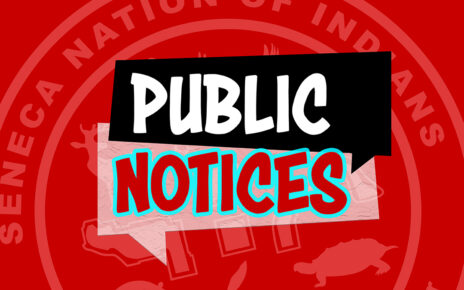COVID-19 variants, booster shots and combating vaccine hesitancy
By Dean S. Seneca | September 20, 2021 | indiancountrytoday.com
Photo above: Dean S. Seneca receives his 1st dose of the Pfizer mRNA COVID-19 vaccine.
As we edge closer to entering the second year of the COVID-19 pandemic, we as a nation are facing a combination of factors that could lead to further public health disasters if not redressed.
Increases in vaccine hesitancy, refusals to participate in even the most basic of preventative protection measures such as wearing a mask and maintaining social distancing, along with the addition of political rhetoric and misinformation regarding COVID-19 and COVID-19 vaccines is a clear recipe for disaster. We are already witnessing the consequences within our Native communities.
Indian Country has been and continues to be disproportionately affected by COVID-19 infections, hospitalizations, deaths, chronic and generational health disparities, political factors and social influences regarding public health policy that has increased the disease burden within our communities.
One of these issues to be specifically concerned about in the potential spread of COVID-19 is the overwhelming housing shortage in Indian Country. This lack of housing has led to overcrowded homes, meaning we often have multiple generations of people living in a single shared space. This makes prevention incredibly difficult.
The prevalence of cardiovascular disease and diabetes is another main issue when it comes to the virus, as individuals with pre-existing conditions and those that are immunocompromised have a reduced ability to fight off infections and are at particular risk of suffering from severe infection, hospitalization, and mortality.
As roughly 45 percent of the population is unvaccinated, and schools begin to re-open, there is cause for concern when sending our children back to class.
Children12 years of age and younger do not yet have authorization for vaccinations, increasing transmission risks among this group and to their family members. Sending our children back into an environment where we are unsure if the teachers have been vaccinated or if the school has mandated masks increases the possibility that they will not only be infected with the virus, but will bring it home with them to other generations of their family — particularly those in their family who may be more vulnerable to infection from the new variant.
With that said, what are the best ways we can protect ourselves, our children, and our community as the Delta variant spreads rapidly throughout the United States?
Get vaccinated
The Delta variant is rapidly spreading throughout the United States. It is more transmissible and appears to have a higher virulence (severity or harmfulness of infection) in vulnerable populations.
Our daily case rate went up to 876, and recently we have seen over 6,000 new cases of this Delta variant in Indian Country — similar statistics to those seen at the end of the last wave in the winter of 2020 — which is a serious cause for alarm.
The current vaccinations provided are very effective, affording full protection against infection to roughly 88.1 percent of vaccinated individuals, while just under 12 percent of vaccinated individuals will become infected with the COVID-19 Delta variant.
Of that 12 percent, the majority had a high enough viral load provided by the vaccination to reduce both infection severity and transmissibility, meaning the vaccine still offered protective benefits.
In short, COVID-19 vaccinations reduce the risk of being infected, reduce infection severity and mortality, and reduce the risk of transmitting the virus to someone else if you are infected.
Already vaccinated? Get a booster.
There is much debate surrounding whether or not individuals in the United States who are fully vaccinated should receive a third booster dose of the COVID-19 vaccine or whether resources should be allocated to vaccinate the global population.
I often equate this to the analogy of the oxygen masks deploying during a turbulent flight emergency. We are taught not to put the oxygen mask on the vulnerable first — not on the children, not on the elderly, not on the physically disabled — but instead to put our own oxygen mask on first.
Once we have done that, we are in a much better position to assist others in need.
The same goes for vaccinations. We can’t help others to the fullest extent of our capabilities if we are not healthy ourselves. Getting a booster not only continues your immunity — which is naturally lost over time in regards to COVID-19 as antibody production declines — but it also helps protect your family, your community and the population as a whole.
The global vaccination effort is another monumental undertaking, one in which the United States must be at the forefront. To do so, we must continue to establish higher levels of herd immunity and promote vaccination efforts, including the distribution of third booster doses. Currently, about 55 percent of the United States population is vaccinated, yet we are still seeing drastic increases in COVID-19 cases.
The pandemic is resurging, and if we had not established the vaccination rates we have attained presently, the situation could be much worse. To prevent these circumstances from escalating, it is imperative that we stop the spread of this virus. Stopping the spread reduces COVID-19’s ability to mutate into another variant, making vaccinations critical for us to make an impact on the pandemic.
Wear a mask. Engage in social distancing. Reduce large gatherings. Clean your environment.
This pandemic is far from over, and we have as a country really let up on many of the preventative precautions that have helped to keep us relatively safe.
U.S. politics, unfortunately, has gotten involved with this public health crisis. This is not a partisan issue, and political agendas should never be involved in establishing and maintaining the health and safety of our people and our children in the face of this pandemic.
Wear a mask, keep six feet of social distance between yourself and others, reduce the size of or postpone gatherings where a large number of guests are anticipated, and wash your hands.
These are all simple behavioral and social actions we can easily engage with daily to reduce the risk of infection and limit the transmission of COVID-19. Consideration, compassion and clemency are essential tools in the combat of COVID-19.
Protect yourself, your family and your community by practicing proper preventative protection measures as well as wearing and utilizing proper preventative protection equipment. Remember, by reducing transmission, we reduce the opportunities that this virus has to further mutate into a more infectious and deadly variant.
Vaccine hesitant? Let’s talk shots.
A commonly asked question is, “Why should I get vaccinated if the COVID-19 infection has a 99 percent survival rate?” COVID-19 symptoms can persist for months, resulting in what is referred to as “long-haul” or “long-term” COVID.
The virus can damage the lungs, heart, kidney and brain, which increases the risk of long-term health problems. Even young, otherwise healthy individuals can feel unwell for weeks to months after infection.
Imaging tests taken months after recovery from COVID-19 have shown lasting damage to the heart muscle, even in people who experienced only mild COVID-19 symptoms, which may further increase the risk of heart failure or other heart complications in the future.
The type of pneumonia often associated with COVID-19 can cause long-standing damage to the tiny air sacs (alveoli) in the lungs and the resulting scar tissue can lead to long-term breathing problems.
The main binding site for the COVID-19 virus is the ACE2 protein, which is expressed in the kidney much more than in the lungs. Even in young individuals, COVID-19 infection can cause damage to the kidney, leading to an increased risk of acute kidney injury and renal complications later in life.
In severe COVID-19 infections, acute kidney injury is observed more frequently and often linked to increased risk of mortality. Even in young people, COVID-19 can cause strokes, seizures and Guillain-Barre syndrome — a condition that causes temporary paralysis.
COVID-19 infection may also increase the risk of developing Parkinson’s and Alzheimer’s disease. Short-term side effects from vaccination and a roughly 80 percent effectiveness of preventing infection from COVID-19 variants, along with a nearly 95 percent effectiveness at preventing serious infection, hospitalization and mortality, far outweigh the risks of facing COVID-19 infection.
If you are unvaccinated, this further increases the risks of developing long-term health damages from this virus. Additionally, the Pfizer mRNA COVID-19 vaccine has just received full FDA authorization and approval, meaning the public can be very confident that the vaccine meets the highest standards for safety, effectiveness, efficiency and manufacturing quality.
In summary, the vaccine benefits outweigh the known risks of contracting COVID-19 and developing the health complications currently being observed in and associated with those suffering from long-haul COVID.
Native communities
While Native populations are at about a 50 percent vaccination rate, there is still much work to be done. Misinformation or promoting negative messages regarding vaccination rates in some areas of Indian Country has instilled a false sense of security in many of us, and negative messaging around the fact that both the Moderna and Johnson & Johnson COVID-19 vaccines have yet to receive full FDA approval and authorization can be misleading to get people vaccinated.
We should be careful not to over-emphasize that currently these vaccines have been approved for emergency authorization use only. This is a true fact — but the way it is presented can be counterintuitive.
This can also damage our goal of combating this virus, reducing transmission rates, and preventing further mutation. It is vital for us to ensure messaging campaigns surrounding COVID-19 are positive, accurate and evidence-based, and encourage engagement in vaccination.
If you are unvaccinated, find a local vaccination clinic near you, make an appointment, and get your vaccine.
If you are vaccinated and have access to a vaccine booster, get the booster.
Regardless of vaccination status, continue to practice safety measures and prevention precautions such as masking and social distancing. If you’re still hesitant, let’s talk. I’m here to answer your questions and meet you where you currently are regarding vaccination status. After all, the only way we’ll make it through this pandemic successfully is together.
Dean S. Seneca MPH, MCURP, Seneca, is the CEO and founder of Seneca Scientific Solution + and the treasurer of the Native Research Network. A professor at the University of Buffalo, he also enjoys teaching about Indigenous health disparities and dedicates his time to improving education concerning historical and intergenerational trauma, as well as improving access to quality healthcare. He is an esteemed researcher and interprofessional collaborator within both the local and national epidemiological and health service communities. Facebook: Dean S. Seneca. Email: deansene@buffalo.edu.




